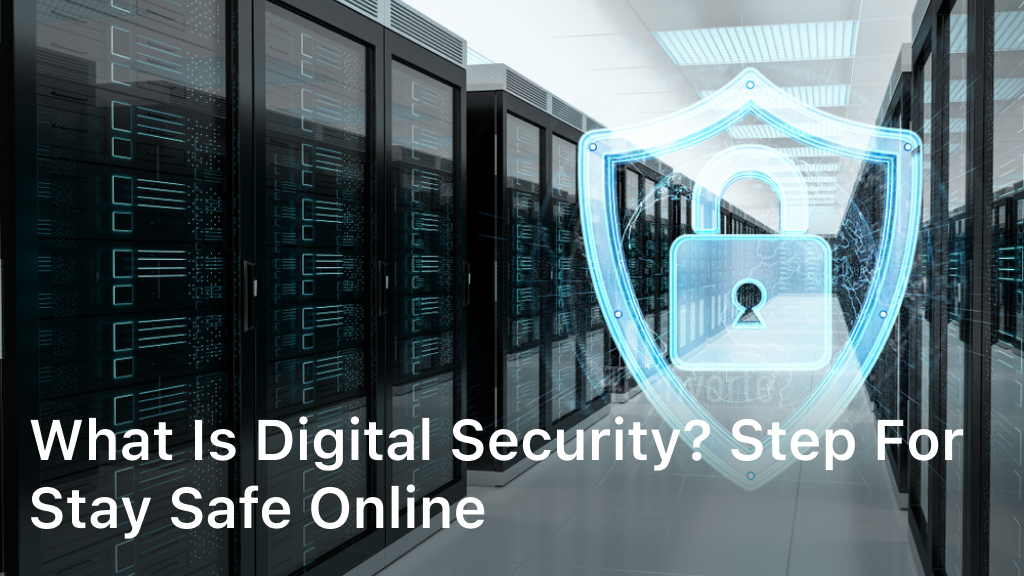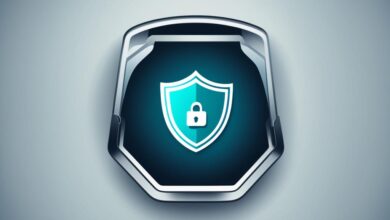Many people wonder, “What is digital security definition?” in today’s digital age.
It is the measures used to protect our online lives.
These measures fight off cyber threats. They keep our online identity, data and digital services safe.
Let’s dive into what digital security means. We will look at its parts and how it protects us online. Understanding digital security is crucial in our digital world.
The Comprehensive Digital Security Explanation
Digital security is more than just one thing.
It is a strong framework that keeps our online lives safe.
We break it down into layers and parts, each important on its own.
By exploring this, we see why staying safe online is crucial for us.
Fundamentals of Digital Security
At its heart, digital security protects our data, which is super important today.
Knowing the basics of digital security is key for anyone using the internet.
It’s about keeping personal info secret, making sure financial actions are right and having access to what we need online.
Varieties of Online Security Measures
Looking at online security tools is like opening a toolbox for our digital world.
It contains different tools to fight off cyber threats.
Things like firewalls, encryption, antivirus software and multi-factor authentication help us stay safe.
Each tool plays a role in protecting us online.
Key Components Defining Digital Safety
Talking about online security, we can’t ignore the main parts that make it strong.
Risk management helps prevent threats.
Incident response plans are there for quick action if something goes wrong.
And, security awareness programs teach us how to be safe online, making us the first defense line.
Why the Importance of Online Security Cannot Be Overstated
Online security is crucial in today’s digital world. It’s a must-have, not a luxury, but for everyone.
This includes individuals and businesses.
The internet has changed how we live and work, which means we need strong security.
Digital threats are becoming more complex.
Our money, personal info and privacy are always at risk.
When hackers succeed, it’s not just about losing money.
Our reputations and trust in the digital world take a hit too.
Seeing how key online security is, is the first step.
We need to protect everything from national security to our personal data.
A good security plan is broad and flexible.
Knowing about cybersecurity helps us move confidently online.
We learn how to stop, spot and handle cyber threats.
Understanding cyber threats is key and so is being aware.
As risks grow, we must stay alert and informed.
The main point? Be proactive. We can protect our digital lives from cybercrime by being ready and securing weak spots.
As the digital world grows, protecting our data becomes even more crucial.
Every day, individuals and companies deal with tons of online information.
This comes with the risk of unwanted data leaks.
These leaks could hurt our privacy and safety online.
An online privacy guide is now a must-have skill. Understanding data protection helps us shield against many online dangers.
This makes us safer as we roam the digital world.
Understanding Data Breaches and Loss
Data breaches are a scary fact today, affecting many.
They happen due to hacker attacks or even simple mistakes. This might expose private information.
We look at how cybercriminals work and the effects of data loss.
Knowing these risks helps us take steps to protect our digital treasures.
Safeguarding Personal Information
Personal data is super important in online presence.
We must keep things like passwords and financial details safe. Doing this helps us avoid identity theft or scams.
We share tips on managing your info safely. Staying alert online is key to fighting cyber threats. This helps keep our digital lives secure.
Regulations and Compliance in Data Security
Rules are crucial for data security. They set the standards for companies on how to handle data safely. This clears up what’s expected in data protection.
Following these rules builds trust with everyone we deal with. We talk about important laws like the GDPR. Such laws guide businesses in keeping data safe and secure.
What Is Digital Security Definition: An In-Depth Look
In today’s digital world, knowing about internet safety is key.
Digital security is not just for fighting cyber threats, it is also for keeping up with our online lives.
It is vital to understand that digital security protects more than just data, it safeguards our entire digital presence.
Defining the Scope of Digital Security
Digital security protects our online life in many ways.
It covers everything from our personal info to big companies’ secrets.
As tech gets better, digital security also has to advance.
Our understanding of cyber threats has changed a lot.
It grew from just being aware to really knowing how digital safety works.
The Evolution of Digital Security Measures
The changes in digital security are amazing. It went from simple passwords to super complex codes.
These changes keep up with growing online dangers.
Now, we use things like fingerprints and AI to stay safe online.
This shows how we’re always finding new ways to protect our digital world.
Real World Applications and Scenarios
Digital security is key in many areas of our lives.
It keeps online shopping safe and our bank info private.
At home, it helps smart devices keep our data secure.
Digital security has become essential everywhere.
It shapes how we use technology and connect with each other safely.
Conclusion
In our connected world, digital security is a must. It serves as a crucial guard against growing cyber threats.
With digital security explanation, our personal and work digital stuff is safe.
This protection keeps our data private, whole, and always available.
This article has shown us how cybersecurity overview shields us.
It’s not just about tech. It includes processes and people working to protect our online lives.
In today’s world, filled with smart hackers and endless internet connections, knowing about digital security is key.
It’s like building a strong wall around our digital selves and our work. Think of this as a call to learn and act.
Understanding digital security and strong data protection is something we all should do.
This way, everyone can help make the internet safer.
Let’s use what we’ve learned to walk through the cyber world more safely and confidently.
FAQ
What is digital security?
Digital security is about keeping digital info and assets safe. It stops unauthorized access, use, or destruction of data. This includes protecting info systems, networks, devices, and data against cyber threats. Examples are hacking, malware, and data breaches.
Why is digital security important?
Digital security keeps digital resources safe and sound. It’s vital in today’s connected world, as cyber threats grow. It can prevent money loss, reputation harm, and leaking of private or important info.
What are some common cyber threats?
There are many cyber threats out there. They include hacking, malware, phishing, ransomware, and data breaches. These threats can lead to money loss, stolen identity, privacy issues, and broken critical systems.
How can individuals protect themselves online?
People can stay safe online in several ways. Use strong, unique passwords and two-factor authentication. Keep devices and software updated. Avoid fishy links and emails. Also, choose trusted antivirus software. Be careful with what you share online and practice safe cyber habits.
What is the role of data protection in the digital age?
Data protection is crucial for keeping personal and sensitive info safe. It helps avoid data breaches, identity theft, and fraud. Both organizations and individuals should use strong data protection methods. This includes encryption, access controls, and security checks.
What are some regulations and compliance requirements related to data security?
There are key rules and guidelines for data security. These include GDPR, CCPA, and HIPAA. They require organizations to protect personal information’s privacy and security.






